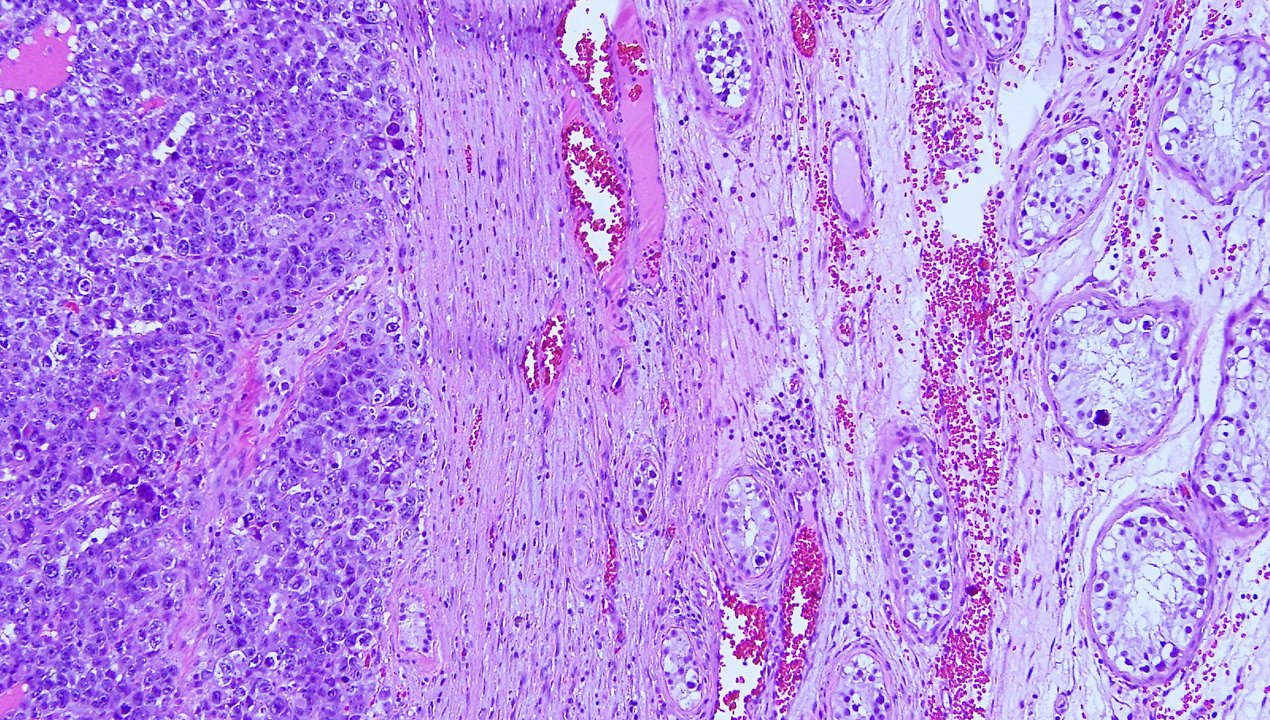We have a diagnosis and a treatment plan!
"It is relatively rare, but treatable"
Justin does have Embryonal Cell Carcinoma
The treatment will be: BEP (5D) REGIMEN
B= Bleomycin
E= Etoposide
P=Platinol
This form of chemo is given 5 days in a row.
Dr. Tillinhaust would like Justin to be in the hospital, (here in Maine) when these are given.
These drugs are very strong, tried and true...but could harm him as well.
They want to closely monitor his lungs and kidneys, both of which could be damaged and they would like him to have an IV going for prevention of dehydration.
He will be very nauseated.
He will loose his hair.
This BEP Regimen will be done 3 times if we are lucky, (another "round" of chemo maybe needed). He will have 21 days between regimens.
When he is done he will have surgery at Dana Farber to remove the testis.
Here is a small bit of information I founds at this web site.
https://www.dovemed.com/diseases-conditions/embryonal-carcinoma-testis/

Microscopic image showing Embryonal cell carcinoma of testis with surrounding intratubular germ cell neoplasia (ITGCN).
What are the possible Complications of Embryonal Carcinoma of the Testis?
Following are complications that may arise from Embryonal Carcinoma of the Testis:
- Infertility
- Retrograde ejaculation
- Excessive blood loss
- Metastasis and the loss of function of the organ/area to which the cancer has spread
- Tumor recurrence after treatment
How is Embryonal Carcinoma of the Testis Treated?
Treatments for Embryonal Carcinoma of the Testis may include the following procedures:
- Removal of the original tumor and the metastatic tumors
- Removal of the testis
- Debulking surgery to reduce tumor size, followed by chemotherapy
- Clotting the vessels in the tumor (embolization)
- Chemotherapy
- Radiotherapy
- Undertaking treatment of underlying conditions
How can Embryonal Carcinoma of the Testis be Prevented?
Embryonal Carcinoma of the Testis may be avoided through the following measures:
- Monthly testicular self-examination
- Genetic testing in individuals with a family history
- Limiting exposure to radiation and industrial chemicals
- Limiting chemotherapy
- Not smoking
What is the Prognosis of Embryonal Carcinoma of the Testis? (Outcomes/Resolutions)
- Embryonal Carcinoma of the Testis often goes unnoticed, until it has spread to other parts of the body, at which point the disease is at an advanced stage. Moreover, the recurrence rate of the tumor is also high
- The following factors determine the prognosis of the condition:
- Size of the tumor
- Stage of the tumor
- Age of the individual
- Overall health of the individual
- Tumor location in the testes
- Number of tumor masses present within the testes
- The prognosis for Embryonal Carcinoma of the Testis is poor because of the aggressive nature of the condition. The overall survival period is about 5 years
Additional and Relevant Useful Information for Embryonal Carcinoma of the Testis:
- Testicular cancers are aggressive in nature; they are also very quick to develop. Nonetheless, they are readily treatable
- Embryonal Carcinoma of the Testis occurs mixed with other forms of testicular cancers in 80% of the cases. This is less dangerous than ‘pure’ embryonal carcinoma, which occurs in 8-10% of the cases
- Testicular cancer is the most common form of cancer in US men aged 15 to 35 years. However, it is still relatively uncommon, with 5,500 cases in the US each year and 0.2-10.3 cases worldwide per 100,000 persons